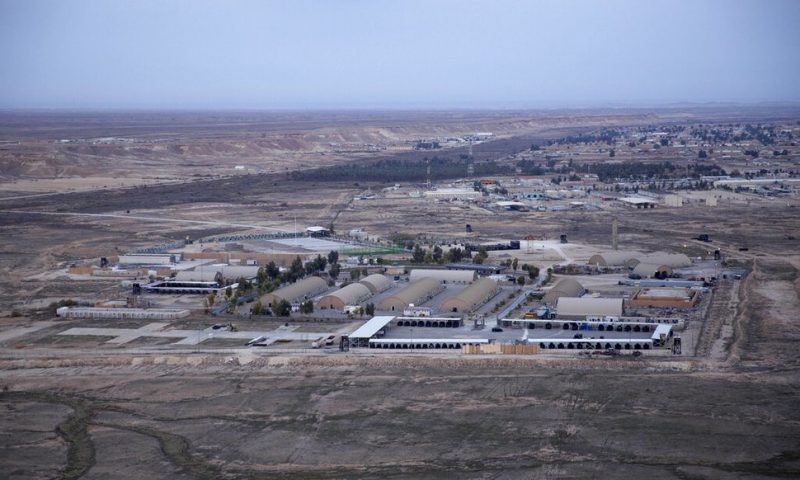The provocative strike comes as the Pentagon believed it had restored deterrence with Tehran following last week’s retaliatory strike on pro-Iran forces in Syria.
A SPRAWLING AIRBASE IN Iraq that serves as one of the most consequential hubs for the U.S.-led military presence there came under attack Wednesday morning by 10 rockets, local officials said.
The perpetrator was not immediately clear and Iraqi authorities were still conducting an investigation as of Wednesday morning. However, Iraqi officials issued carefully crafted statements shortly afterward that indicate they believe Iran was behind the attack.
Pentagon spokesman John Kirby in a statement said one U.S. civilian contractor had a heart attack while sheltering during the strike and later died. No uniformed U.S. troops were injured, Kirby said. The U.S. cannot attribute responsibility for the attack, he said, deferring to the Iraqi investigation.
The provocative attack comes at a time of escalating tensions between Tehran and Washington following a U.S. airstrike on a Syrian position last week housing pro-Iranian militia. The retaliatory strike, which American officials say they hope has restored deterrence with Iran, was in response to a string of attacks by pro-Iranian militia in Iraq against a series of U.S. installations there.
Wednesday’s rocket attack risks further spikes in violence at a time the Biden administration is desperately attempting to coerce Iran to return to diplomatic negotiations. It comes as the U.S. is attempting to broker diplomacy in the region and as Pope Francis is planning a visit to Iraq later this week.
Spokesman Army Col. Wayne Marotto tweeted early Wednesday that 10 indirect-fire rockets had struck al-Asad airbase in central Iraq, roughly 150 miles northwest of Baghdad. It houses troops from the U.S.-led coalition combating the Islamic State group and other extremists in Iraq and Syria. Indirect fire refers to the common method of attack by insurgent forces in American warzones in the Middle East involving projectiles often activated remotely and lobbed at targets rather than fired directly at them, making it more difficult to identify the perpetrators immediately and to defend against.
Iraq’s senior leaders referenced the attack at a previously scheduled meeting Wednesday morning to discuss diplomatic efforts and the pope’s upcoming visit.
The officials did not blame Iran overtly for orchestrating the attack. However, statements attributed to the commander in chief of Iraq’s security forces at the meeting can only be interpreted as a clear warning to Tehran to cease its provocative actions, analysts say, including Wednesday’s rocket strikes.
According to a translation of an Arabic readout of the meeting released early Wednesday, the commander said his forces were focusing on militant parties operating outside the Iraqi government’s decision-making process, and stressed the importance of Iraq’s distancing itself from regional and international competitions for power.
“It is a clear message to Iran and to its Iraqi proxies not to use Iraq in the former’s escalation with the United States,” says Randa Slim, a regional expert and senior fellow at the Middle East Institute.
President Joe Biden has appeared eager in recent weeks to break from his predecessor and adopt a more conciliatory approach with Tehran, at least to bring it back into negotiations regarding its nuclear program. Iran has said such talks are impossible until the White House lifts the crippling sanctions then-President Donald Trump imposed as a part of his “maximum pressure” campaign after unilaterally walking away from the last nuclear agreement.
A strike the U.S. carried out against pro-Iran forces in Syria on Friday was seen as a calculated attempt not to escalate tensions with Iran – notably that it did not take place in Iraq and risk further inflaming pro-Iranian militia violence there.
“One of the things we were certainly hoping to achieve as a result of that strike was to deter future attacks by militia groups on our people, our facilities and our Iraqi partners,” Kirby told reporters at the Pentagon on Tuesday. “And we certainly hope it has that effect.”
Rocket attacks against bases housing U.S. forces in February come as Iran also seeks revenge for Trump’s decision to kill prolific Iranian Gen. Qassem Soleimani – who was responsible for coordinating Shiite Muslim militias in Iraq – in a drone strike in early 2020, along with a prominent Iraqi commander of those forces.
Speculation has emerged that Iran may not still control the Iraqi militias as closely as it did during Soleimani’s tenure. However, Kirby told reporters last week that the Defense Department still considers the forces aligned with Tehran.
“It’s been no secret that they do have ties to Iran,” he said at a press briefing on Feb. 26. “That’s a longstanding understanding that we have.”

